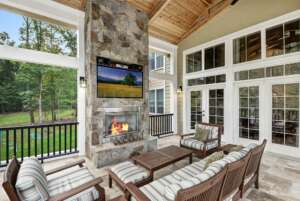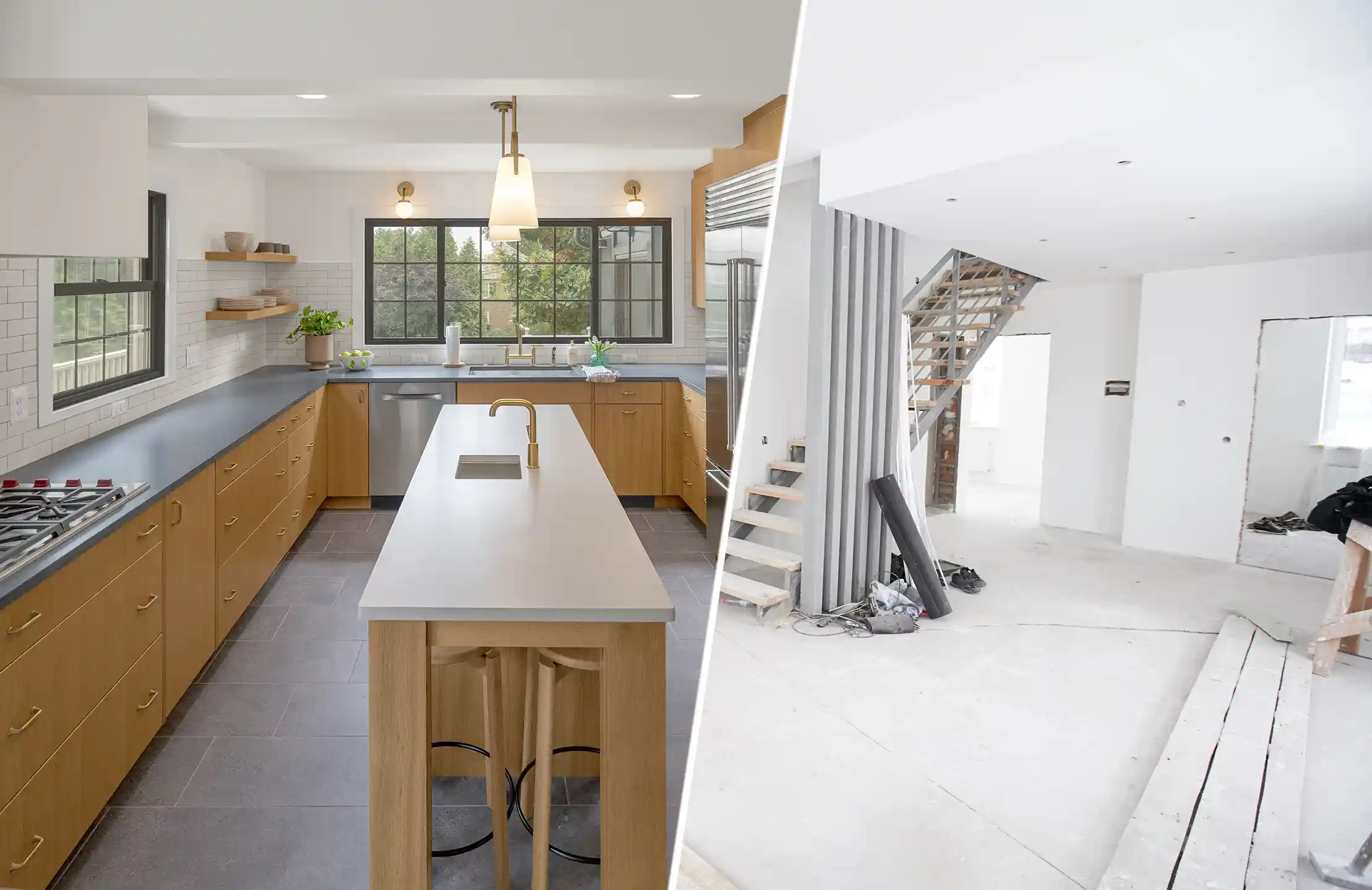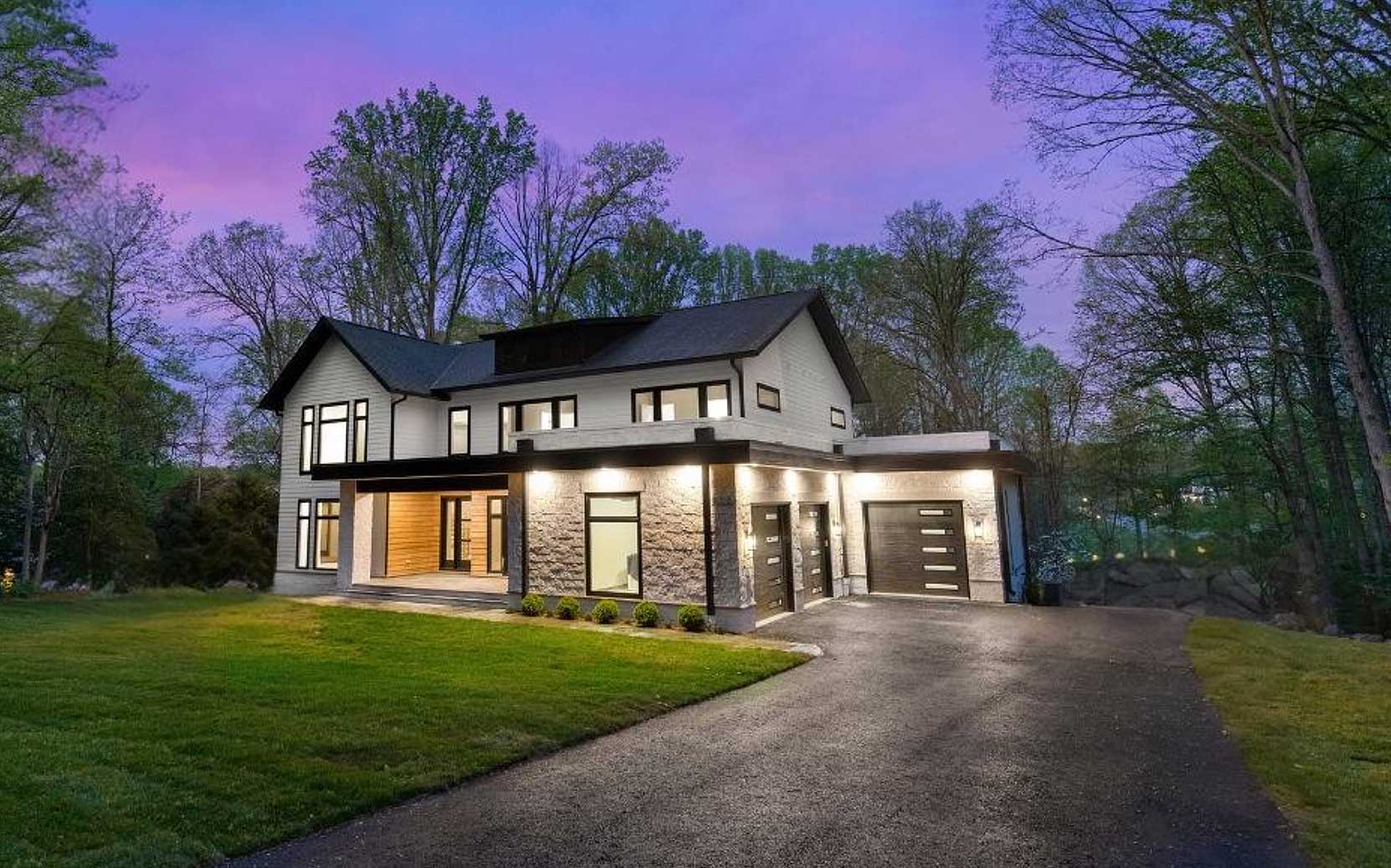In a world where being comfortable often trumps being up for a challenge, Tim Winter, the President and Founder of Paradigm Homes, embodies a different ethos. He believes that true growth arises from embracing the challenges that others shy away from. This philosophy is not just a guiding principle for Tim; it’s the foundation upon which he has built Paradigm Homes—a company that goes beyond constructing houses to constructing lives.
Tim’s story is one of humble beginnings, shaped by the influences of his hardworking mother, father and hardworking uncles. From an early age, he witnessed the dedication and determination required to succeed in the construction industry. Tim was inspired by what he witnessed growing up and he set out to redefine the standards of Custom Home building, laying the foundation for Paradigm Homes. Join us as Bart Berkey interviews Tim Winter, on the Most People Don’t Podcast, where we learn more about the captivating narrative behind one man trying to improve the Custom Home building industry.
A Culture of Excellence
At Paradigm Homes, excellence is not just a goal – it’s a way of life. Tim’s leadership philosophy centers around empowering his team, fostering a culture of growth, and collaboration. Through personalized training and development programs, Tim ensures that every member of his team is equipped with the skills and knowledge to deliver exceptional results, exceeding client expectations at every turn. In fact, the Paradigm Homes brand promise is “Excellence Every Step of the Way Home”.
Expanding Horizons
From the bustling streets and highways of the DMV, to the serene landscapes of Charleston, SC, Paradigm Homes’ reach knows no bounds. With projects spanning multiple states, Tim’s vision for excellence continues to evolve and expand. Each new endeavor presents an opportunity to push the boundaries of innovation and creativity all to serve our clients better.
Giving Back: The Paradigm Foundation
Beyond the confines of for-profit construction, Tim and his wife Jen are on a mission to make a difference through their Foundation. With a focus on serving ultra-poor communities, including areas such as the Dominican Republic, Kenya, Brazil, the Central African Republic, and soon, the Amazon, where families struggle to survive on less than $2 a day, they have built homes, community centers, and hope in places where it’s needed most. Through their unwavering commitment to giving back, Tim and Jen are weaving a legacy of compassion and generosity that extends far beyond the walls of Paradigm Homes.
A Legacy in the Making
In Tim Winter’s world, building homes is not just a profession – it’s a calling, and a testament to the power of vision, passion, and perseverance. As Paradigm Homes continues to grow and evolve, one thing remains constant – Tim’s unwavering commitment to excellence and his relentless pursuit of making a difference, one home at a time. With each project, Tim’s legacy grows stronger, leaving an indelible mark on the world of Custom Home building and beyond.
Paradigm Homes stands as a beacon of innovation, compassion, and excellence in the Custom Home building industry. Through the unwavering dedication and tireless pursuit of excellence, Paradigm is not just building houses – they’re creating lasting impact by shaping communities in a way that will leave an enduring legacy for many generations to come.
Ready to learn more about Paradigm Homes? Explore our projects, services, and mission on our website. Together, we can make a lasting impact.
If you are interested in exploring the Design/Build process with Paradigm, reach out to us today! We look forward to working with you!
Full Podcast Transcription:
Bart B: Welcome to the podcast, Most People Don’t, But You Do, where we have stories and conversations about people that are exceptional, people that are going above and beyond, people that are doing really interesting things. Today’s guest, his name is Tim Winter. He is the president and founder of Paradigm Homes. I had the pleasure of meeting him just recently through some mutual friends, so shout out to Jim Hadley in the Northern Virginia area. I was immediately intrigued by Tim’s perspective of what he does for a living, and probably more importantly, how he does it. We’re going to be chatting with him about his background.
He’s a fellow Penn State Nittany Lion. Without further ado, Tim Winter, welcome to the show.
Tim W: Thank you, Bart. I really appreciate you having me on. It’s always great to talk to another Penn State brother, so appreciate it.
Bart B: Yeah, and Jim, when he introduced us, he said, you need to meet this guy, Tim Winter. You guys have so much in common, and it’s okay if we use our Pittsburgh accent for the next couple of moments. But understanding that you grew up in Pittsburgh, you went to Penn State just like me, you had some health scares just like me, an entrepreneur better than me, just like me. You’re doing some really cool things. Tim, our listeners like to learn about the individual, and the questions that I really like to get into is the drive behind the why. Yes, you are massively successful with Paradigm Homes. You’re expanding into new markets. You have your own architectural division. You’re doing some really incredible things. But what our listeners want to learn is the why. We’re going to start at the beginning, Tim. If you can share with our listeners about growing up, and what did you think you wanted to do for a career while you were growing up?
Tim W: Yeah. My Pittsburgh roots are where it all began. I think there’s a lifestyle and a culture there that’s different from a lot of parts of the world that I believe you can relate to.
It’s grit. It’s blue collar. It’s get things done. It’s work hard. Just go through all those motions. That was instilled with me from being a kid. As young as I can remember, my dad used to buy houses, and fix them up, and renovate them. I’ve been around the construction renovation world since I was probably four or five years old. He was always doing stuff. He’s renovated some of our own properties. When I got to the age where I could actually do some things, my dad started having me work. Seven, eight, nine, I’m painting, scraping paint, doing different things, cleaning houses, ripping carpet out. That’s where it started. I started with that with my father. My mom, she was a stay-at-home mom, but this is where the entrepreneurial side comes from.
She ran a beauty salon out of the basement, and also had a catering company. That work ethic was instilled within me from a kid. That’s really where a lot of who I am, the grit that I have, the determination that I have, starts there. Although, I didn’t enjoy it. As a kid, I wanted to go play with my friends. I wanted to go play basketball and baseball. I was big in the sports. That was another thing that helped me growing up. Still now, I’d rather do that. The mixture of being able to be a kid, play sports, do all those things, and then work alongside my parents, it was great. At some point, I got wise and said, you know what? You guys should probably pay me for some of this work that I’m doing.My dad and I negotiated. He’d either let me bid out a job, or I’d give him an hourly rate on some things. That hard work was something that has been instilled within me from the beginning. I try to encourage others. Unfortunately, some people don’t understand that. They don’t come from that same environment. They didn’t grow up in a city like Pittsburgh, and didn’t see the struggle that a lot of people had there, and still have there. It was a pretty fun upbringing. There’s a lot of stories there that my dad and I, we didn’t get along. It was a little bit of a back and forth. I think I knew better than him as a kid, telling him what to do. I think that’s what most kids do. They don’t want to listen to their parents. Until now, I look back, I’m like, yeah, my dad was pretty smart.
Bart B: You answered two questions immediately. I was going to ask you, did you enjoy it? Then the second part was, did you get paid for it? You answered both of those things. Tim, was that your dad’s full-time job? Was he involved with construction, or was that just a side gig for him?
Tim W: It was a side gig for him. He worked at Duquesne Light, which is the power plant, the Beaver Valley Power Station. He worked there. He’s an engineer type. I honestly don’t know exactly what he did there, but that’s what he did. He worked a bunch. He would do these rental properties as a secondary way to make money. I’ve seen that, and I’ve always been intrigued by the real estate piece. Even to the point when I was 18, my dad actually helped me buy my first property. Now, it wasn’t very much. It was like $20,000, but then he helped me get a loan, and he helped me renovate it. My dad was my actual, my first employee, because I went off to Penn State. I’m in Penn State, Maine. My dad’s back house was in New Brighton, PA. My dad’s back renovating the house. My dad was my first project manager.
Bart B: Oh, I love it. I love it.
Tim W: Reverse the roles.
Bart B: Yeah. It’s not unusual when I talk to people, and it’s really cool, Tim. I talked to other individuals from Pittsburgh. I had the president and CEO of Primanti Brothers, Adam, a terrific gentleman.
Tim W: Did he send you a sandwich? Did he send you some sandwich?
Bart B: Whenever I go in there into the strip district, I mention his name, and it doesn’t really get me anything, but that’s okay. Anyway, a terrific gentleman and similar values. He worked for Giant Eagle.He worked for Eaton Park. It’s the grit aspect of growing up and then being exposed to different things. Tim, as you were sharing about your father, my father was an art educator.
He was an art teacher for 35 years. And on the side, he would make silver jewelry. Every evening in the basement, in the garage, he would make silver jewelry. That was his entrepreneurial side gig in order to be able to pay for three kids. I have two older sisters who go to college. It’s what you had to do. My mother was a stay-at-home mom for a while, but then she started to do some things. I really have great appreciation for what you just shared. Tim, do you have brothers and sisters?
Tim W: Yes, I have a younger sister and a younger brother.
Bart B: I’m the oldest of three. Were they involved? Were they encouraged to scrape, paint, and take down boards and help with the home renovation?
Tim W: Yes and no. My sister, not as much. My brother and I used to complain all the time, though, why doesn’t Kylie get involved in all of this? We would complain about that, but no, they were around it. My parents had all of us doing work and chores around the house. We lived on four and a half acres, so there was always grass to be cut and mulch to be put down.
We had a pool, so if we wanted to maintain it, we were all trained in making sure the pool had chlorine and all those things. We were all involved. My brother is also an entrepreneur.
He started his own company about six years ago. He’s in the countertop fabrication company, and he’s doing extremely well for himself. My sister’s an entrepreneur in her own way.
She has five kids, so she’s a baby factory.
Bart B: The entrepreneur aspect, the innovation aspect, the hard work, the grit, we’re getting a sense of who Tim Winter is. You had to work, wanted to be able to have good things and do nice things. As you just described, growing up on four acres and having a pool, did you feel that you were middle class? Did you want for things? Did you feel that you were upper class compared to the neighbors and your friends in school? How did you feel?
Tim W: Yeah, I would describe us as middle class. Some of those things were, I’ll give you an example. When Air Jordans became a thing, everybody was pushing to get that. My mom was, yeah, I can afford to buy those for you, but I only spend $30 on shoes. If you want those shoes, you need to figure out how you want to get those. I went and got a paper route at 12 years old, delivering papers, plus making some money doing some chores for my dad. That was the mindset that they always had. If you want something, you need to earn it. You need to go after it. For them, I would say, yeah, middle class. Then what transitioned? I’ve always liked nice things. Obviously, it started with the Jordans, and I still buy them to this day as a nostalgia stake. My wife’s probably tired of all the shoes that I buy. But that’s part of my childhood. That’s part of what symbolized what helped me do what I do, is my parents pushing me to go above and beyond and think differently. It wasn’t until I was probably 18, we would spend a lot of time with my uncle that actually lived in Northern Virginia, and still does. He became very successful.
I’d seen the difference between a place like Pittsburgh and Northern Virginia. At 18, when I graduated high school, my uncle took me and my grandfather actually on a trip to Puerto Rico. At that moment, that was the time I’m like, wait a second, there’s more to this world that is out there. My parents, they gave us a lot, they trained us a lot, but our vacations were camping trips. That was the extent of it. The biggest trip we ever did was a cross-country trip, but the majority of it was camping and seeing the sights that my dad and mom wanted to see.
That moment in my life, with my uncle, he became an inspiration to me and still is, a big mentor in my life, and just showed me that there’s more to the world than what we’re used to in Pittsburgh.
Bart B: Yeah. I’m curious about that, because both of my sisters are still in Pittsburgh, and my mother is still in Pittsburgh. I told you my father had passed away. The aspect of more than Pittsburgh, and this is not anything negative against the city, because incredible people and incredible grit. The element of traveling for the first time. I guess the question is, what do you believe is more than? What do you begin to see when you travel? Because I shared with you, Tim, I come from hospitality, former Ritz-Carlton, and we’re hopefully working on a project soon. What was the element of what you began to see that intrigued you?
Tim W: I think it was just the hotel that we stayed in was nicer than any place I’ve ever stayed before with my parents. The dinners that we had, hanging out at the pool, it was just a different environment and a different vibe. Mixed with that, I spent part of the summer one year actually down here in Northern Virginia with my uncle. You live here, you know this market. It’s one of the top two or three counties in the entire world as far as wealth goes. It’s a different world.
And so I’d go back to Pittsburgh, and not a knock on Pittsburgh, like you said, it’s got the grit and there’s tons of great people. My parents still live there. My sister still lives there.
I’ve got uncles there, family and friends, other family and friends still there, other aunts and uncles. Just going back without seeing some place like Northern Virginia, then going back to Pittsburgh, I think that was a big eye-opener that, wait a second, everything’s new in Virginia. New houses, new roads, new stores. It was just gross. And then you go back to Pittsburgh and it’s the same store that’s been there since the 60s or whatever, 70s. And so there’s no change.
There’s no real gross. And a lot of that has to do with what happened there in Pittsburgh when the steel companies all pulled out of there and still left the country and all of that left a very depressed area.
Bart B: Yeah. And I think the word that I’m learning from you just now, or the theme that I’m getting from you is growth. Yeah. And I share this statement. I don’t think I shared this when I met you the other day. It’s easy to be, but it’s better to become. And there’s nothing wrong with being. There’s people that are content with being, but there’s people like you. There’s people like your uncle, like your brother, like you’re like, there are so many people that we are associated with where we want to grow and we want to become better. That affects your business, that affects your mindset. And we will get into that momentarily about the thing that I thought was really cool about you, Tim, and I complimented you the other day. I’m presenting to a lot of different companies, some big and some small, and there might be a desire to get better, to improve, but often people might not have the influence because they’re working for a company that’s been around for 80 years and there’s 80 board members ahead of them and the political environment doesn’t allow them to always do the right thing because they have to make decisions that are affecting stock prices and how the street reacts. But you as an entrepreneur and you being the president of your own company, you have the ability to affect that and influence that. And we’ll get to that in a moment. When you were going to Penn State, can you share with our listeners what you studied? Because it wasn’t initially about building homes and being an entrepreneur. Can you share with what you studied and what you were thinking you wanted to do when you were in college?
Tim W: Yeah. So as a kid, I loved to argue. And one of the passions of my grandfather was always to be an attorney. So I said, he never did it. I’ll take that task on and I’ll become an attorney. And so I started out as a pre-law mindset major. And then I realized that there’s a lot more school that comes with that and not a knock against school. That’s just not me. I’m a very visual learner. And so I immediately pivoted to… I pivoted because I met a girl that was being transferred to the main campus at Penn State. We were at a branch campus, Penn State Beaver. And so that whole transition was how do I get to Penn State Maine sooner than waiting another year and a half? And so I took four years of German in high school. And so like, all right, I’ll declare a German major because Penn State Beaver doesn’t have German. And so I transferred. They were able to transfer me. They moved me to Penn State. Immediately within that time frame, I realized that German in college is a lot harder than German in high school. And so I was getting tutored or whatever. Finally, I took my beating and I said, you know what? I’m out of this. Let me find something else that fits me better and where I don’t have to lose credits because I’m not a school guy. I went to school because that was what you had to do to get a job. And so for me, I went through… I learned a lot more from just living, living on my own, all that kind of stuff than maybe some of the things that I learned educationally. So from there, I went into… Penn State has a degree called Labor and Industrial Relations. So it’s very HR-driven, labor unions. And then I had a minor in business. So from there, I always knew because I was in college and I started this real estate company with my dad. So I’ve always had this mindset of how can I make money, do this kind of stuff? And the girl that I actually met is now my wife of 23 years. So that was a good decision. The change from pre-law to German for that short time. But yeah, so through that whole transition, it just… If anything, that shows you more of I’m trying to find solutions. One of the core values at Paradigm is to be a solutions architect. And that’s something that I’ve always, since I was young, always tried to solve a problem, make things easier or better. And that’s probably where the rub was with my dad because he’s like, no, do it this way. I’m like, no, but I could do it better this way. So that’s always how I’ve been. I’ll always try to buck the system a little bit to get, I don’t want to say get my way, but figure things out.
Bart B: Yeah. And getting better and making it better and perhaps making it more efficient. Now, not in a lazy way, correct? More efficient and better in order to be able to do more. (16:34) Yeah, exactly. Where do you think that comes from? Your father was not that way. He’s going to be doing it the same way. My dad was the same way, right? Your mother probably wasn’t that way. Why do you think you are driven to do more, Tim?
Tim W: I think I saw the challenges that they had. And I was very aware to how my dad worked. He worked hard, but he didn’t all the time work smart. He always hired the cheapest people and the lowest cost. And I get it. He’s trying to make money. I get that side of it. But for me, when I came out, I said, when I go after whatever it is I’m going to go after, I want to make sure it’s done right. I’ll pay more for the right people. I’ll go, I’ll pay more to stay at the nice hotel. That was my mindset because of watching my father, watching my mother, both awesome people. And then having an uncle as an influence that shared a lot with me, opening up the world, my eyes to the world. I’m like, there’s more out there. And I want to go, I want to go after it. I want to accomplish it. I want to take over the world. And so I don’t know exactly where that came from. It’s just something that’s always been in the core of who I am.
Bart B: Yeah, pretty cool. And it’s the, again, the drive to probably have a better life than what you saw your parents having. And it was a good life, but there’s nothing wrong with making it better, making it more simple and certainly having fun and doing it. When you and I met the other day in person, you shared, okay, your first job, maybe it was out of school and we don’t need to reference the company, but you were working for a different home builder. Was that your first job out of school?
Tim W: Yeah. First job out of school. Yeah. So my wife and I got engaged our senior year at Penn state and we said, whoever gets a job first, that’s where we’re going. And so we ended up in Northern Virginia working for a national builder here. And so that’s how we ended up in Northern Virginia.
Bart B: And your wife’s first name is Jen, right?
Tim W: Yeah.
Bart B: Okay. Cause we have to mention Jen, shout out to Jen for doing the right thing and making this guy happy. And I do want to talk a little bit about her because I know you have a foundation as well that she is running for you. So you’re working for an organization, a national home builder seven years into it. Was there something that happened? And I can’t remember what you shared with me seven years into it. Seven years, correct?
Tim W: Yep.
Bart B: Was the economy changing? Did something change? What prompted you to say, you know what? I could probably do this. And there’s so many cool correlations that we’re already learning. Tim, I could probably do this more efficiently and more effectively. And I could probably do it better. Not unlike the thought that you had with your dad, not unlike the situation that you’ve seen with other people. Here’s the theme: we’re uncovering the layers of Tim Winter. Did something happen with the economy? What prompted you to say, I could probably do this better and I could probably do it more efficiently.
Tim W: Yeah, this was 2006/2007, I’ve always had the idea of wanting to do my own thing, right. But I needed to learn and grow and understand some things before I can do it. So one of the things that led to that was the first is I built my own house at, I was 26 going into 27. And for me, I need to do it myself first before I could sell that to somebody else. Like I needed to just map that. So that was the first thing that helped push me on. But also during that time, after the house was built, we moved in 2006, the market started to turn. And so I had worked my way up through the ranks at this builder. And then they started letting lower-tier people go. They saw things coming that the housing industry was changing and times were changing. And so they started to get wise and cut the people where they needed to maintain their publicly traded company. So maintain their stock price. And so at that moment, they didn’t know what to do with me. So they moved me back into the field and I was building two houses. Now, when you work for a builder of this size, production builder, when I was actually in the field three or four years prior to that, I was building probably 20 houses at a time with two or three assistants. So you’re pretty busy. And going to work to build two houses was not a lot of work. It wasn’t exciting. I was doing some service projects, but it wasn’t getting me out of bed. And so I had this idea of I can go build two houses on my own, make things better, be my own boss, make some money from this and see where it goes. And so I started the idea of that towards the end of 2006 and early into 2007. And then I officially left in May of 2007, right when two months before the mortgage meltdown happened. But thankfully, I was young, dumb and naive. And I’m just like, let’s figure this out. And so we hit the addition and renovation, friends and family circuit, got into commercial work, retail, restaurants, coffee shops, basically anything to get through that lull. It wasn’t until I left 2007 to be a Custom homeowner. It wasn’t until 2010 is when I built my first Custom Home.
Bart B: Okay. All right. So you did, there’s that grit again. You figure it out, right? You were doing whatever you needed to do to continue to pursue your vision, which is just remarkable. Alright. So we’re going to fast forward a little bit. You start your own business. You know that you can do things better, respectfully. You can do it more efficiently. You can certainly build two homes on your own. Great. When you started your company, did you feel that you were fulfilling your passion? Did it feel right?
Tim W: Yeah. Even to this day, after 17 years, I love what I do. It’s not work to me. Now there’s days that I’m like, oh, this is miserable. Why am I doing this? But for the most part, 98% of the time, like I really enjoy what we do. And so yeah, it’s been fun.
Bart B: So why do you enjoy what you do?
Tim W: I think it’s really over the last few years, it’s the people that I get to pour into and help them become better. Like over the last four or five years, we’ve grown a lot and I’ve brought a bunch of staff on and a lot of staff are younger and it’s been fun to watch them grow. So for me, it’s being a leader and helping them become leaders. I love the industry that we’re in because it’s cool. You take something from nothing and turn it into an amazing house or renovation project. But on my mind, I’m also renovating people’s lives, right? The people that are on my team, I truly care about them. I truly care about them and want to make them both professionally and personally successful. And so that’s what we’re working on right now. This year is like, how do we create a high performing team? What can I do as a leader to help them become better? I read a lot of leadership books and I’m actually going to a John Maxwell event next week, all in the efforts to make myself better, but also to make my team better.
Bart B: Yeah. What is your most favorite recent book that someone just gave you like two days ago that you’re reading that is green on the cover and starts – Most people don’t.
Tim W: Yeah.
Bart B: You’re looking around to see if it’s on your bookshelf. It better be right on your desk and hopefully you’re packing it on your trip to Florida.
Tim W: It’s still in my backpack over there.
Bart B: All right. Fair enough. Fair enough. And Tim, it’s really cool that you are selfless. The answer is, and this is why I selected you and I asked you and I’m honored that you are on the show. Most of the people that I’m talking to, when I ask that question, it’s always about other people. You didn’t say that I’m building wealth for whatever, or that I get to drive fancy cars. It’s not about that or that you’re buying a third vacation home. Your first answer was about helping people grow. You’re 12 to 13 people that are immediately full-time on your staff. And then plus you’re working with all the contractors, which is just such an altruistic, noble reason for doing what you’re doing. Plus you love it. And Tim, one thing that I thought was really unique about you, you had shared that you do Motivational Mondays for your team and you’re bringing in different ideas. And again, I’ll probably going to come and present to your team sometime. Educating them, inspiring them, motivating them to get better. And I shared with you, that is unique. It is unique for a business owner. It’s unique for someone that is in the custom home building world, in the architectural world. That is just unique because their focus usually is just on self and revenue. And what I’m learning very quickly and having my own company, that it’s really about purpose over profits. And those people that believe in purpose over profits are the ones that are going to be feeling fulfilled and continuing to help others, which is then another little bit of a shift. I want to ask you about Jen and the foundation that you have started to be able to give back to people. Again, it’s something that no one told you to do, but I think in your heart and in Jen’s heart, you’re like, this is what we want to be able to do. Would you mind sharing with our listeners? Because also it’s a very giving gesture of what you both are doing.
Tim W: Almost 11 years ago now, Jen went through a kind of a tough time in her life. Her father passed away, and she had been let go from her job, and so she’s just trying to find herself. She ended up on a trip to the Dominican Republic with our church to do some anti-human trafficking work. On that trip, they were doing some home visits, and they saw some shelters that the youth group from our church previously had put together and assembled, and all of a sudden, she was flooded with emotion. Sorry.
Bart B: Yeah, it’s good to be flooded with emotion. Thank you. Thank you for sharing that.
Tim W: Yeah, so she gets flooded with emotion, and she hears God audibly say, this is why you’re here. You’re here to help. You’re here to build houses, and so she comes home to me all excited, and she says, we need to build houses, but I don’t know how to do it. You do. We need to figure it out. Fast forward, we’ve been doing this now for 10 years. We started in 2014. We built our first house in November of 2014, and since then, we’ve built over 60 houses, one church, two community centers, and we’re in, I think, three or four countries. We started in the Dominican Republic, then we went to Kenya, and then Brazil, and now we’ve got a new partnership in the Amazon, and we did a project in Central African Republic as well. That’s where the big community center was. Jen’s heart is very giving, very servant-minded, and she leads with that passion, and that’s her purpose is to make a difference through the houses, and for us, it’s not just about the physical house that gets donated from the foundation. It’s the spiritual components because we work with the local church. We work with the local community. We want the community to build from within, not that here come the Americans to save the day. Right now, they need some support, but what can the community do to come around So we see the community come together and they come work on these projects for free that these people have nothing they’re coming to work for free sometimes giving just their time and or they’re making meals for people that are working on the job or what whatever it is. So it’s a very holistic approach to poverty. We’ve learned a lot about poverty. Now we serve what we call the ultra-poor, and that’s people that live on less than $2 a day. And so when we were going through setting up the foundation, you need to have a focus when you’re trying to solve a big problem like this. So we thought let’s go after the force of the poor and so that’s where our heart was let’s do that let’s follow that let’s go serve the people that need it the most and hopefully we can influence them physically with a new home but then Also spiritually by the community coming around them and changing their lives in a couple different ways. And I tell you what the stories that we and the families that we’ve seen and heard and changed like it’s unbelievable it’s been but inspiring and so that’s the other reason what gets me up in the morning now if you’re I’m in my own home office here now but if we in my office there’s a picture behind me that hangs and I’ll show you next time you’re in it’s a picture of the Dominican Republic and it’s the streets it’s a reminder to me this is what I this is one of the other things why I do what I do right it’s not only just helping my team become better and grow and building beautiful houses and designing beautiful houses but it’s also helping those less fortunate that need some help and support so that’s also what gets gets me up in the morning and having an amazing wife to run that race with has been such an amazing journey.
Bart B: Yeah. And Tim, what’s interesting and not all of the video is going to be shared, right? Just clips because it’s primarily audio. But as soon as I asked you about that, do you know what your body language did? No. You are about as close to the camera as possible. And before, because here’s the interesting thing, Tim. Most of the conversation I’m talking about you, I’m asking about you. And that’s not a natural thing for most people. So you’re sitting back, and yes, you’re comfortable and relaxed. As soon as I asked you about the team, you got a little bit closer. As soon as I asked you about your foundation, you got even closer. That shows where your heart is, which is such an amazing and beautiful thing. Tim, I just have a few additional questions for you. Our listeners are inspired by stories, and that’s what I do. I’m a motivational storyteller. People will remember stories 22 times more than data. We lead with stories. Are there any stories that come to mind with a particular family or person that received a home or was influenced by a community center? Can you share?
Tim W: Yeah, absolutely. So the very first home recipient, her name is Amanda. When we initially selected the community selects these, we, Jen and I just sign off like not Jen, we have a board that we took everything to. So it’s very kind of organized. But the first home was supposed to go somewhere else, but there were some issues with the land. So we always want the people to make sure that they own the land, have some type of clear title so that we don’t have any issues. Somebody comes in, “Hey, this is a brand new house. I’m taking it from you,” right? No, we have to have proof. And the community layers on came to us and said, “Hey, there’s this woman, her name’s Amanda. She’s the next candidate.” Like, perfect. So a couple of days before we’re supposed to come into the country, she was working in one of these free zones, like factories and whatever, and breathed some stuff in and got really sick. And she was saving money for her son who wanted a refrigerator. Right now, a refrigerator is one of those things, it’s all big luxury in the Dominican Republic. Plus, you don’t have power. It goes in and out, like it’s very sporadic. And so she had to take that money and use it to buy her medicine and things like that to stay alive. Like, she nearly died. And so here we come, and she’s very quiet, reserved to herself, not really understanding what’s going on. She thinks we’re renovating her existing house. And so we proceed to explain to her, “No, we’re building you a brand new house. We’re going to take that down and we’re going to build you a new house.” And in that process, she started the next time when the house was done, she moved in. Jen went down to visit her, and her life was impacted spiritually. Her heart and the physical need was met. Now, the spiritual need was met. And what this woman did is she had, I think she has four kids, and she started businesses there. So there was a Comm liaison person that came in and helped her kind of create some crafts and some different things that they would sell to teams that would come visit. And so she caught that entrepreneurial bug, and every time we go see her, she’s doing some other business. She’s got a nail salon on the front porch. She was growing pigs. She was just all of these things. And I forget how many years ago it was, about maybe five or six years ago, she received an award from the vice president of the Dominican Republic for her progression out of poverty because she also started helping the community.
Bart B: Wow. So one house, one person, major impact. Right? There’s more stories like that, but that’s the first one. So yeah, it was pretty cool. And so she was then helping to build community based on the generosity of you and Jen and the foundation with Paradigm homes. Remarkable. So Tim, just maybe two more questions for you. And again, thank you so much for sharing. And I think I shared with you, the podcast has become very popular. Top 15% most shared podcast in the world, which is just remarkable. We know that people like it and they’re sharing, and it’s proactively sent to over 100,000 people. The last element that we’ve not really talked about because it is just showing yourself, right? You’re wanting to give to others. We haven’t really even talked about Paradigm homes, which is okay. But I do want to make sure that people are understanding what makes Paradigm homes unique and special. When we met in person the other day, we were talking about the vision and the goal and the mission. You’re building some amazing custom homes, a lot in the DMV, right? The DC market, DC, Maryland, and Virginia market. You’re expanding into a couple of other areas. Tell me if I’m getting this correct. Charleston?
Tim W: Yep, we’re in Charleston right now. And going back to why we’re in Charleston is because my wife gave up moving to Northern Virginia 23 years ago. Yeah, six or seven years ago, we fell in love with Mount Pleasant, the Old Village area of Charleston, and we ended up buying a second home that we rent out as well. It’s an investment property so we can go back and forth. And so that’s where Jen wanted to be, and I’m like, let’s do it. And initially, she’s like, you’re not allowed to work here. Okay, fine. And then COVID hit, and everything in Virginia shut down. So we went to South Carolina because everything was open. And I’m just watching, we go for walks every day, and I’m seeing all these houses being built. And I’m like, Jen, I said, I’m like a caged animal, like need to do something. And so I’m like, I’m gonna go get my license in South Carolina and we’ll figure that out. And so she’s now embraced it two years, two, three years later after that, it’s been in place. And she just, she’s starting to realize that, no, I said, look, no matter where you put me on a deserted island, I’m going to figure out how to do some work, make a business, make some money, help some people. Like, that’s just who I am. And that’s how we ended up in Charleston.
Bart B: Okay, in what other markets are you in currently?
Tim W: So we’ve got the architecture company, it’s called Homeluxe Architecture. We started that. We’ve been working, we’ve brought in-house design about two years ago, but we slid off into this secondary brand, Homeluxe, early last year. And we’ve got a project that we’re doing in Texas for a client on the design side. We’ve got a project in Massachusetts, actually two projects in Massachusetts that we’re doing for clients on the design side. We’ve got eyes on Florida and maybe the Charlotte area, just trying to figure it out. But we want to make sure we’re successful in Northern Virginia first and then ultimately South Carolina, Charleston second.
Bart B: Yeah, the growth is going to be incredible. And you had started to share a little bit about the why. And I shared an example with when I present to a hospitality company, I will ask individuals, well, describe the hotel, describe the resort. And they use certain words, but it doesn’t necessarily differentiate. And then I encourage people when they’re describing things to talk about what makes it unique and special and then also how is it going to make people feel. You started to share a little bit about that, your customers with Paradigm Homes. How do you want them to feel and how do you get them to feel a certain way?
Tim W: Yeah, so construction’s messy. It’s hard. It’s drawn out. A lot of times goes over budget, a lot of times goes over schedule, and it’s just a product of the industry. And so for us, what can we do? And we’re not perfect at it. We’ve got behind on projects and gone over budget on projects, just like everybody else. But our goal is what can we do to make sure our clients have an amazing experience through that? What can we do to make sure that we’re doing things differently, really? Because at the end of the day, we’re all in this construction world. We’re all in the same industry, buying from the same subs and suppliers and maybe working with a lot of the same either architects, not so much now because we brought that in-house, but working with a lot of the same people. So really, what the only thing you can really do to differentiate yourself in this custom home building renovation space is to provide an exceptional experience. And for me, that’s why I’m really trying to train and develop my people because people help people. And so that’s where I need to make sure that the client has a great experience because the person on the other end of the call or in a meeting is treating them with respect, and they’re going after something different and being unique. And Paradigm means to be an example. So we want to be the example of excellence in the industry. Now, excellence is probably never achieved, but it’s something that becomes a habit that you work towards. It’s a constant direction. It’s discipline. It’s daily doing the right thing and going above and beyond. And so for us, it’s really what can we do? And we’re working on things to grow and make ourselves different. And it starts obviously with me making myself better and then leading the team and making them better and then them helping our clients achieve what they want in their home desires and the overall experience.
Bart B: Yeah, so well stated. And I thought you were going to throw in a “doing what most people don’t,” you almost did. You almost did, but and we do what most people don’t, but you really do. And you are trying to get better, as you said, you’re not perfect, but you are raising the level of excellence so that your customers do have a better experience. That’s the differentiator. And you care, that’s right. And I know you’re going to be, you’re going to continue to expand in the markets, your homes are going to get increase in value, you’re going to have more customer referrals than ever before because of the grit, because of the heart, because of the desire to get better, not just for you, not just for your team, but to have a better experience for the customers. And that is truly what is separating Paradigm Homes and you, Tim Winter, from anyone else. Doesn’t matter where they are in the country, your ability and desire to give, with you and Jen, the foundation, all of those things wrapped up together are just exceptional. You are really doing what most people don’t. I would encourage our listeners to check out Paradigm Homes, paradigmhomes.com, a great website, there’s a lot of great videos, examples, messaging about the story and how Paradigm Home started, things that we did not have a chance to talk about today, photo galleries, and reach out, right? Reach out and connect with Tim Winter, president, founder of Paradigm Homes. I’m gonna have one last question for you, and I’d like to do this with our guest. I’m gonna ask you to fill in the blank. Tim, Most People Don’t blank…What would you say?
Tim W: I would say most people don’t show up and give it their all. Yeah, I think a lot of people want the sexy beach body, but they don’t want to go to the gym and go through the diet. Most people want to be a business owner, but they don’t have the wherewithal to take on all of it that it takes because it’s not easy. It’s a lot of work. So I think a lot of people don’t truly show up. If they do, then they’re not giving it their all. They’re not really trying to get out after it. They’re not disciplined enough. They’re not creating habits. Everybody Everybody wants to take the path of least resistance, and unfortunately, the only way you can really grow is you gotta, it’s adversity, you got to take on the challenges, you got to do the hard things, you got to get up when nobody else is up, you got to work when no one else is working, and you just got to think differently. And it starts with that level of discipline and mindset and focus. Unfortunately, a lot of people don’t have that drive.
Bart B: Yeah, and the lesson that I learned, thank you for sharing that, Tim. And what I learned from you today is you need to be able to find the thing that is going to want to get you up, that is wanting, that is fueling your desire to show up and go above and beyond. And for you, it is helping your team, for you, it is helping your customers, for you, it is giving back. And then it is and then it is the business aspect. But I could tell those are the things that are motivating you to be successful, and that is really unique and very special. Tim, thank you again, Tim Winter, president, founder of Paradigm Homes. Check them out, paradigmhomes.com. And if they are not in your market, this is going out globally. If they’re not in your market, reach out anyway, all right? Reach out anyway because you never know where Paradigm Homes and Tim and team are going to be expanding to. Grateful for your time, Tim. Thank you, thank you, you, and yeah, keep doing what most people aren’t doing. You are truly a unique individual, very special, and can’t wait to talk more to you and to be able to meet Jen in person.
Tim W: Awesome, I appreciate your time, Bart. Amazing. Thank you.











